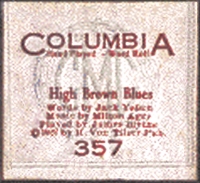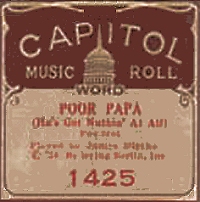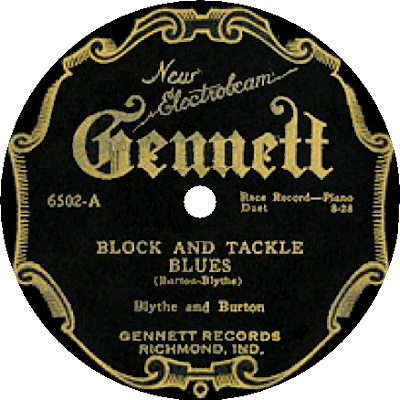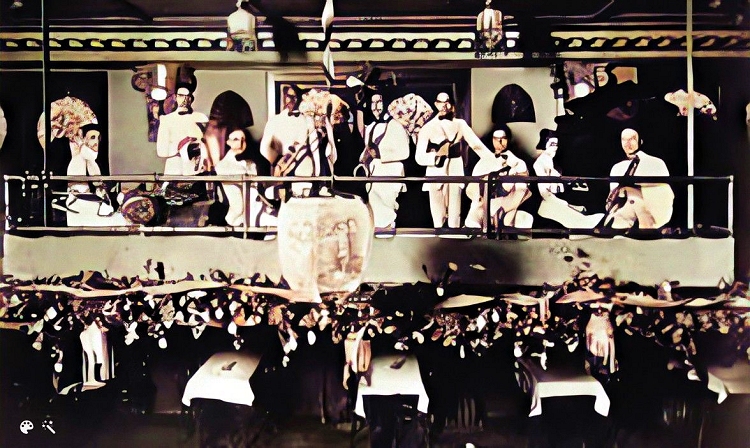Jimmy Blythe represents another case of a working musician/composer who had some moderate success, yet very little is known about him outside of ragtime and boogie piano circles. He was born to former slaves turned sharecroppers Richard D. Blythe and Rena (Stovall) Blythe in South Keene, Kentucky, just southwest of Lexington. James was the youngest of five surviving siblings out of a total of eleven born to the couple. Others included Dovie (4/1880) who died in childhood, Bessie (7/1882), Effie (2/1886), Mary M. (11/1889), and Aubrey (7/1897). At least one sibling born after James had died by 1910.
The Blythe family was living together when the 1900 census was taken before Jimmy's birth. However, by 1910 their situation had changed. They had moved to Lexington, and may have fallen on hard times in the process. Rena was working as a servant in the home of Florent Wilson. Effie and Mary were working as cooks and boarding with widow Emma Ross as well as a cousin, Lana Stovall. Richard and Jimmy were difficult to locate in that record or the 1910 Miracord, but it is known they were still living in Lexington with James working as a janitor or day laborer. The extent of Jimmy's early involvement with the piano is not well known, nor if he received any type of training in Lexington. Given the situation it seems that he may have learned simply by observing other ragtime performers and imitating their style. Not being found in the census also suggests living conditions that probably precluded regular schooling.
Rena was working as a servant in the home of Florent Wilson. Effie and Mary were working as cooks and boarding with widow Emma Ross as well as a cousin, Lana Stovall. Richard and Jimmy were difficult to locate in that record or the 1910 Miracord, but it is known they were still living in Lexington with James working as a janitor or day laborer. The extent of Jimmy's early involvement with the piano is not well known, nor if he received any type of training in Lexington. Given the situation it seems that he may have learned simply by observing other ragtime performers and imitating their style. Not being found in the census also suggests living conditions that probably precluded regular schooling.
 Rena was working as a servant in the home of Florent Wilson. Effie and Mary were working as cooks and boarding with widow Emma Ross as well as a cousin, Lana Stovall. Richard and Jimmy were difficult to locate in that record or the 1910 Miracord, but it is known they were still living in Lexington with James working as a janitor or day laborer. The extent of Jimmy's early involvement with the piano is not well known, nor if he received any type of training in Lexington. Given the situation it seems that he may have learned simply by observing other ragtime performers and imitating their style. Not being found in the census also suggests living conditions that probably precluded regular schooling.
Rena was working as a servant in the home of Florent Wilson. Effie and Mary were working as cooks and boarding with widow Emma Ross as well as a cousin, Lana Stovall. Richard and Jimmy were difficult to locate in that record or the 1910 Miracord, but it is known they were still living in Lexington with James working as a janitor or day laborer. The extent of Jimmy's early involvement with the piano is not well known, nor if he received any type of training in Lexington. Given the situation it seems that he may have learned simply by observing other ragtime performers and imitating their style. Not being found in the census also suggests living conditions that probably precluded regular schooling.In the mid-1910s Effie married C.V. Merritt of Illinois and subsequently moved to south side of Chicago. Mary and her new husband Mario Slaughter were not far behind and moved in with the couple, as did Bessie. She also shows as having been married to a Mr. Clark, but her husband was not living with the rest of the group in 1920. Jimmy came to Chicago in the late 1910s (reports vary, but 1917 to 1918 seems most likely). In the January 1920 census Jimmy is difficult to locate. He had been living with Effie, but was not present for the census or had moved out of the Wabash Avenue home of his sisters.
Once in Chicago Blythe hooked up with transplanted Ohio ragtime/blues pianist Clarence M. Jones, who was classically trained, but already had some ragtime song successes to his name. Jones ran his own studio in Chicago's south side. As jazz started to enter the musical lexicon he quickly adapted to it and was able to teach some of the art of performance to Jimmy. While little else is known of his time in Chicago from 1919 to 1922, it is likely Jimmy was also exposed to a number of fine pianists and band musicians, and had played in a few public venues.
His break came in 1922 when Jimmy was hired by the Columbia Music Roll Company. He set to work recording popular songs and instrumentals of the day at a breakneck pace with increasing originality. Modeling some of his style on what he learned from Jones, Jimmy took the increasingly popular moving octave and boogie bass and applied them to some of the recordings, both for standard home use and multi-song commercial rolls. While not all of them are properly attributed, it has been estimated that Blythe recorded as many as three hundred rolls for Columbia, and then for Capital when the company was reorganized in 1924.
Modeling some of his style on what he learned from Jones, Jimmy took the increasingly popular moving octave and boogie bass and applied them to some of the recordings, both for standard home use and multi-song commercial rolls. While not all of them are properly attributed, it has been estimated that Blythe recorded as many as three hundred rolls for Columbia, and then for Capital when the company was reorganized in 1924.
 Modeling some of his style on what he learned from Jones, Jimmy took the increasingly popular moving octave and boogie bass and applied them to some of the recordings, both for standard home use and multi-song commercial rolls. While not all of them are properly attributed, it has been estimated that Blythe recorded as many as three hundred rolls for Columbia, and then for Capital when the company was reorganized in 1924.
Modeling some of his style on what he learned from Jones, Jimmy took the increasingly popular moving octave and boogie bass and applied them to some of the recordings, both for standard home use and multi-song commercial rolls. While not all of them are properly attributed, it has been estimated that Blythe recorded as many as three hundred rolls for Columbia, and then for Capital when the company was reorganized in 1924.Despite the limitations of paper rolls which had varying note resolutions, no dynamics, and often only edited sustain pedal punchings, Blythe's excellent performance skills still cut through and his rolls became quite popular. He was able to take simple popular songs and create an engaging performance from them in short order. Many of these were taken from the simple sheet music and expanded to include blues riffs, stride or boogie-woogie bass, and even pseudo-novelty figures. Musicians around Chicago and beyond worked to emulate his engaging style as his fame grew.
In April 1924 Blythe entered the recording studio and started to cut sides for Paramount Records (no affiliation with the film company of the same name). Some of his material, including songs written with his friend Alex J. Robinson, had already been covered by other artists on that label, so he had a head start. His first tracks, Armour Avenue Struggle and Chicago Stomp, had the rolling boogie-woogie blues bass pattern throughout. This ostensibly made him the first boogie-woogie pianist to be recorded on record, but verification or agreement of this fact is a matter of semantics on this point. It has also been suggested that his recording of Jimmie Blues from 1925 influenced Pine Top's Boogie Woogie recorded by Clarence "Pine Top" Smith in 1928, and some of the work of boogie-woogie player Albert Ammons.
Over the next few years, Blythe recorded with a variety of his own ensembles, some assembled just for recording. These included in approximate order Blythe's Sinful Five, Jimmy Blythe and his Ragamuffins, Blythe's Washboard Band, Blythe's Washboard Ragamuffins, Blythe's Owls, The State Street Ramblers, The Dixie Four and The Midnight Rounders. Many of these ensembles featured clarinetist Jimmy O'Bryant who Blythe apparently favored. Jimmy also played on sessions with Jimmy Bertrand's Washboard Wizards, and two fine piano duets each with Jim "Buddy" Burton and Charlie Clark, who was the son of his sister Bessie, working at that time as a barber. Their single piano recording of Bow to Your Papa, reproduced on piano roll as Regal Stomp, has become a blues and stride classic.

Paramount was not the only company looking to use Blythe. With his groups or other artists he also cut sides for Vocalion Records, Okeh Records, and Gennett and their subsidiary Champion Records. In addition, he worked with musicians like reed player Johnny Dodds and accompanied a number of singers such as Sodarisa Miller and Gertrude "Ma" Rainey, though not always properly credited. Collectively between his solo and ensemble records and his piano rolls, Jimmy accumulated a wealth of approximately five hundred recordings in just nine years, a feat that has rarely been paralleled, and for that time in society only approached by a couple of other African-American artists.
While many of the left hand lines of Blythe's compositions and recordings have a similar theme or style, he still did manage some distinction in many of his original works. Some were recorded by other artists, and he even co-wrote some on the spot with performers, including Priscilla Stewart and Trixie Smith. The family was also in on the act as his sister Mary contributed to Have Mercy. Another contributor he met around 1924, an amateur pianist named Janice (sometimes Jannie) from Louisiana, became his wife near the end of the year. Together they composed Midnight Strutters.
Jimmy's most frequent partner was singer Alex Robinson who was married to Aletha Dickerson of Paramount Records. Listings in the pioneering black newspaper The Chicago Defender, and occasionally in other Chicago papers, show Jimmy and Alex playing from time to time on Chicago radio station KYW in 1926 and 1927. Aletha's role should not be downplayed in the life of Jimmy or many black musicians. Starting as a secretary with Paramount she eventually helped to cultivate the talent and get their works published. In the case of Jimmy she got co-credit on at least two of his pieces. One of them, Fat Meat and Greens, was covered by no less than "Jelly Roll" Morton. Most of his compositions remained on record or piano roll. However, at least a couple were published by Chicago music school czar Axel Christensen, who also may have inadvertently taken credit for a couple more Blythe originals. His biggest hit, at least amongst performers, was Mecca Flat Blues, the title referencing a large and sometimes controversial apartment complex built in the 1890s. It also found its way into print in a Paramount produced folio arranged in part by Aletha Dickerson.
 |
In spite of his busy recording schedule, there are indications, some through scant notices and word of mouth, that Blythe also performed live. Among the places mentioned in newspapers and a couple of published interviews were Mamie Ponce's tavern on the south side. Given the number of local venues in that area known as "the stroll," including the famous Dreamland Café on State Street and even the Lincoln Gardens, it is easy to imagine that he or his band was invited to play on one or more of the stages within that district. Yet Jimmy is also remembered for being in the background to some degree, drawing attention to his groups by not drawing any to himself. He was considered relatively quiet for an active musician, and perhaps this is one of the reasons that Blythe has been overlooked in some jazz histories, even though he is remembered among pianists. It has also been conjectured with some credible basis that Blythe used at least a couple of different pseudonyms for his work, including Duke Owens and George Jefferson.
As of the 1930 census Jimmy was living on South Michigan Avenue with Mary and her husband Mario, Bessie who had been recently widowed, and her son Charlie. He listed himself as a musician, while Mario was a janitor and Charlie was working for a barber. It appears that Janice, who very little is known about, was separated from Jimmy and living on East 44th Street. Both of them indicated that they were still married, however, so the circumstances are unclear. The couple never had children. Not quite a month after he turned 30, Blythe contracted meningitis and within a few days was gone.
Fortunately a great deal of his piano work was left behind to be discovered by future generations of boogie-woogie and stride pianists, and is still performed decades later in the 21st century. His role in fostering the growth of boogie or boogie-woogie piano has been challenged over time. It was a style that evolved from barrelhouses, largely in the Chicago area, but boogie-woogie was also heard in Kansas City and even Texas concurrently with early Chicago boogie blues. What Blythe did was to use his talent and musical charisma to get the style heard, showing it could be applied to popular music, not just blues. While Clarence "Pine Top" Smith is known as the guy to set the template and helped to provide the name for boogie-woogie blues with his early recordings, Blythe preceded him in utilzing the same left-hand style both on piano rolls and records, and would undoubtedly have been a major player in that genre in the 1930s had he lived.
 Compositions
Compositions